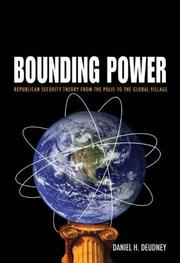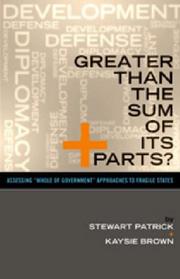| Listing 1 - 10 of 84 | << page >> |
Sort by
|

ISBN: 0691119015 9780691119014 0691138303 Year: 2007 Publisher: Princeton, N.J. Princeton University Press
Abstract | Keywords | Export | Availability | Bookmark
 Loading...
Loading...Choose an application
- Reference Manager
- EndNote
- RefWorks (Direct export to RefWorks)
Realism, the dominant theory of international relations, particularly regarding security, seems compelling in part because of its claim to embody so much of Western political thought from the ancient Greeks to the present. Its main challenger, liberalism, looks to Kant and nineteenth-century economists. Despite their many insights, neither realism nor liberalism gives us adequate tools to grapple with security globalization, the liberal ascent, and the American role in their development. In reality, both realism and liberalism and their main insights were largely invented by republicans, mainly writing about republics. The main ideas of realism and liberalism are but fragments of republican security theory, whose primary claim is that security entails the simultaneous avoidance of the extremes of anarchy and hierarchy, and that the size of the space within which this is necessary has expanded due to technological change. In Daniel Deudney's reading, there is one main security tradition and its fragmentary descendants. This theory began in classical antiquity, and its pivotal early modern and Enlightenment culmination was the founding of the United States. Moving into the industrial and nuclear eras, this line of thinking becomes the basis for the claim that mutually restraining world government is now necessary for security and that political liberty cannot survive without new types of global unions. Unique in scope, depth, and timeliness, 'Bounding Power' offers an international political theory for our fractious and perilous global village.
Political philosophy. Social philosophy --- History as a science --- Conservatism. --- Security, International --- Philosophy. --- Sécurité internationale --- Conservatisme
Multi
ISBN: 9789264190306 9789264190290 Year: 2013 Publisher: Paris OECD
Abstract | Keywords | Export | Availability | Bookmark
 Loading...
Loading...Choose an application
- Reference Manager
- EndNote
- RefWorks (Direct export to RefWorks)
Le point sur les causes, les enjeux et les outils de réponse régionaux des conflits liés aux ressources à partir d'études de cas en Afrique de l'Ouest. Les terrorismes comme AQMI et Boko Haram sont ensuite abordés, ainsi que les mécanismes légaux encadrant la lutte contre le terrorisme.
National wealth --- Polemology --- West Africa --- Terrorism --- Security, International --- Terrorisme --- Sécurité internationale
Book
ISBN: 9780415556286 9780415556279 9780203868508 0415556287 0415556279 0203868501 1135246149 128288641X 9786612886416 1135246130 9781135246099 9781135246136 9781135246143 Year: 2011 Volume: *1 Publisher: London Routledge, Taylor & Francis Group
Abstract | Keywords | Export | Availability | Bookmark
 Loading...
Loading...Choose an application
- Reference Manager
- EndNote
- RefWorks (Direct export to RefWorks)
This volume aims to provide a new framework for the analysis of securitization processes, increasing our understanding of how security issues emerge, evolve and dissolve.? Securitisation theory has become one of the key components of security studies and IR courses in recent years, and this book represents the first attempt to provide an integrated and rigorous overview of securitization practices within a coherent framework. To do so, it organizes securitization around three core assumptions which make the theory applicable to empirical studies: the centrality of audience, the co-de
Polemology --- Security, International. --- National security. --- Sécurité internationale --- Sécurité nationale --- Security, International --- National security --- Sécurité internationale --- Sécurité nationale
Book
ISBN: 9004522549 9789004522541 Year: 2022 Publisher: Leiden Brill/Nijhoff
Abstract | Keywords | Export | Availability | Bookmark
 Loading...
Loading...Choose an application
- Reference Manager
- EndNote
- RefWorks (Direct export to RefWorks)
Les inspections internationales sont une technique courante du droit international. Les inspecteurs visitent des lieux de détention, des usines chimiques, des réacteurs nucléaires et des stations de recherche en Antarctique, pour évaluer si les règles du droit international sont respectées. Malgré cet intérêt pratique, les juristes internationaux ont eu tendance à négliger les inspections internationales, du moins en tant que catégorie générale : les études existantes tendent à se concentrer sur des régimes particuliers, fournissant beaucoup de détails mais sans réelle approche globale. Le présent ouvrage adopte une démarche différente. Il examine un large éventail de régimes d'inspection et cherche à en dégager les éléments transversaux. Tout en reflétant l'hétérogénéité des inspections, ce volume a pour principal objectif de situer les inspections internationales dans le champ plus large des moyens de contrôle du droit international et de mettre en évidence leur unité au-delà de leur diversité. Combinant des perspectives panoramiques et kaléidoscopiques, les seize chapitres du volume encouragent les juristes internationaux à s'engager encore dans l'étude des inspections internationales. International inspections are a common technique of international law. Inspectors visit prison camps, chemical factories, nuclear reactors, and research stations in Antarctica -- to assess whether the provisions of international law are complied with. But notwithstanding this practical relevance, international lawyers have tended to neglect international inspections, at least as a general category: what studies exist, tend to focus on particular regimes, providing much detail but insufficient orientation. The present volume takes a different approach. It looks at a wide range of inspection regimes and seeks to identify cross-cutting issues. While reflecting their heterogeneity, its central aim is to situate international inspections in the wider field of international law's means of control and to highlight elements of unity in diversity. Combining panoramic and kaleidoscopic perspectives, the volume's sixteen chapters encourage international lawyers to engage more fully with international inspections.
International law --- Inspektion. --- Völkerrecht. --- Security, International. --- International law. --- Environmental law. --- Sécurité internationale. --- Droit international. --- Environnement --- Droit. --- Sécurité internationale.
Book
ISBN: 9780199583300 0199583307 Year: 2010 Publisher: Oxford Oxford University Press
Abstract | Keywords | Export | Availability | Bookmark
 Loading...
Loading...Choose an application
- Reference Manager
- EndNote
- RefWorks (Direct export to RefWorks)
Polemology --- United Nations --- Intervention (International law) --- Security, International --- History --- United Nations. --- Intervention (droit international) --- Sécurité internationale --- Histoire --- Nations Unies --- Security, International - History - 20th century --- Sécurité internationale
Book
ISBN: 9780190604509 9780190604493 9780190604516 9780190604523 9780190604530 0190604506 0190604492 Year: 2016 Publisher: Oxford Oxford University Press
Abstract | Keywords | Export | Availability | Bookmark
 Loading...
Loading...Choose an application
- Reference Manager
- EndNote
- RefWorks (Direct export to RefWorks)
Traditional analyses of global security cannot explain the degree to which there is "governance" of important security issues ? from combatting piracy to curtailing nuclear proliferation to reducing the contributions of extractive industries to violence and conflict. They are even less able to explain why contemporary governance schemes involve the various actors and take the many forms they do. Juxtaposing the insights of scholars writing about new modes of governance with the logic of network theory, The New Power Politics offers a framework for understanding contemporary security governance and its variation. The framework rests on a fresh view of power and how it works in global politics. Though power is integral to governance, it is something that emerges from, and depends on, relationships. Thus, power is dynamic; it is something that governors must continually cultivate with a wide range of consequential global players, and how a governor uses power in one situation can have consequences for her future relationships, and thus, future power. Understanding this new power politics is crucial for explaining and shaping the future of global security politics. This stellar group of scholars analyzes both the networking strategies of would-be governors and their impacts on the effectiveness of governance and whether it reflects broad or narrow concerns on a wide range of contemporary governance issues.
Polemology --- Security, International --- International organization --- Sécurité internationale --- Organisation internationale --- International cooperation --- Coopération internationale --- Sécurité internationale --- Coopération internationale --- Security, International - International cooperation
Book
ISBN: 9284501490 Year: 2001 Publisher: Bruxelles OTAN
Abstract | Keywords | Export | Availability | Bookmark
 Loading...
Loading...Choose an application
- Reference Manager
- EndNote
- RefWorks (Direct export to RefWorks)
Book
ISBN: 9781784534882 9781786720061 9781786730060 1784534889 Year: 2016 Publisher: London I.B. Tauris
Abstract | Keywords | Export | Availability | Bookmark
 Loading...
Loading...Choose an application
- Reference Manager
- EndNote
- RefWorks (Direct export to RefWorks)
If the rise of Islamic State can overthrow powerful states in a matter of weeks, what kind of a secure future can the world expect? After more than a decade of the war on terror, security specialists thought that Islamist paramilitary movements were in decline; the threat from ISIS in Syria and Iraq, Boko Haram in Nigeria, al-Qaida in Yemen, the chaos in Libya and the return of the Taliban in Afghanistan have all shown that to be wishful thinking. Once again the West is at war in the Middle East. Paul Rogers, the distinguished global security specialist, provides a much-needed look at the rise of such global terrorist movements from the margins and presents a new argument as troubling as it is compelling. While Islamic State has taken root in the Middle East and North Africa and has increasing impact across the world as thousands of young men and women rally to its cause, Rogers argues that it should be seen not just as a threat in its own right but as a marker of a much more dangerous world riddled with irregular war.
Terrorism --- Security, International. --- Terrorisme --- Sécurité internationale --- Religious aspects. --- Aspect religieux --- IS (Organization) --- Economic order --- Political philosophy. Social philosophy --- Polemology --- Northern Africa --- Middle East --- Sécurité internationale
Book
ISBN: 1885039018 Year: 1998 Publisher: Washington, D.C.
Abstract | Keywords | Export | Availability | Bookmark
 Loading...
Loading...Choose an application
- Reference Manager
- EndNote
- RefWorks (Direct export to RefWorks)
Conflict management --- Intervention (International law) --- Security, International --- World politics --- Gestion des conflits --- Intervention (Droit international) --- Sécurité internationale --- Politique mondiale --- Sécurité internationale --- Polemologie --- Polémologie --- Polemology --- War --- 355

ISBN: 9780937722985 0937722987 Year: 2008 Publisher: New York, N.Y. International Peace Academy
Abstract | Keywords | Export | Availability | Bookmark
 Loading...
Loading...Choose an application
- Reference Manager
- EndNote
- RefWorks (Direct export to RefWorks)
| Listing 1 - 10 of 84 | << page >> |
Sort by
|

 Search
Search Feedback
Feedback About UniCat
About UniCat  Help
Help News
News